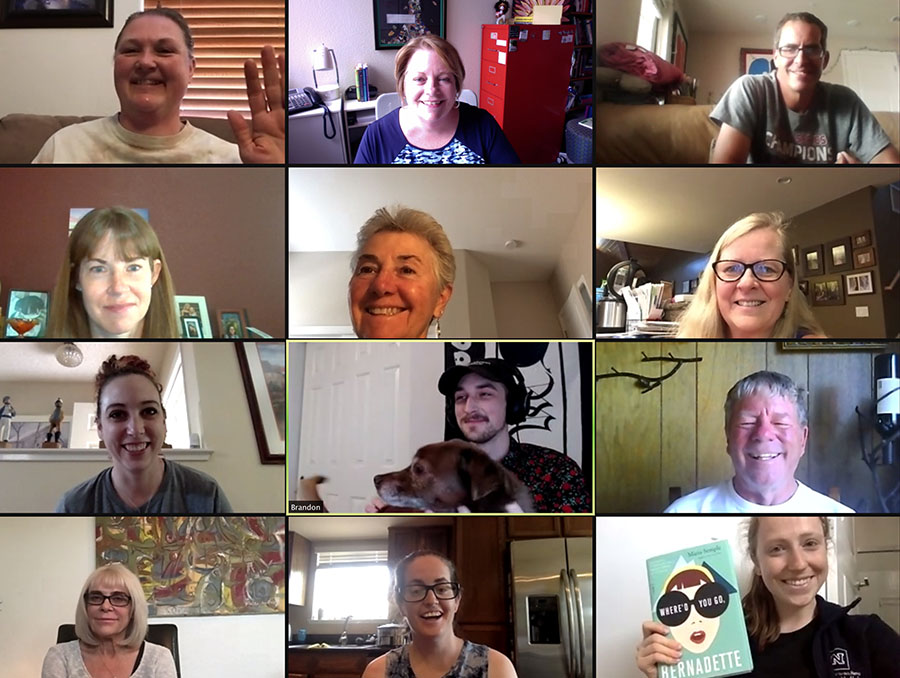June is Aphasia Awareness Month, a national campaign to increase public awareness about the language disorder and recognize people who are living with or caring for people with aphasia. While many people have never heard of aphasia, which generally results from damage to portions of the brain that are responsible for language, it affects about 2 million Americans, according to the National Aphasia Association (NAA).
The Aphasia Center of Nevada (ACN), housed in UNR Med's Department of Speech Pathology and Audiology, strives to reduce the isolation of aphasia and create a space where people engage in life activities that are meaningful to them. ACN activities, including weekly gatherings for conversation groups and an aphasia book club, have been held virtually for the last year due to the global COVID pandemic.
“While technology has been great in helping us connect, there have been some limitations,” said Tami Brancamp, Ph.D., CCC-SLP, associate professor and clinical supervisor, Department of Speech Pathology and Audiology. “Technology can be extra challenging with a communication impairment. The ability to read an email or social media invitation and connect via the internet is a challenge for many people with aphasia.”
Recently, Dr. Brancamp sat down with ACN members to discuss living with aphasia during this last year.
How has the pandemic made life especially challenging for those with aphasia?
Our members shared that it has been really hard to stay isolated at home. Aphasia is already an isolating experience and members have worked hard to get out into the community, make new friendships, and find new ways to live their lives. As we have all experienced, the pandemic shut us down. We all had to learn how to exist in very isolated fashion. Our members shared that having reduced opportunities to communicate face to face with people outside their home has negatively impacted the gains they made with their communication abilities and increased loneliness. They also miss the ability to come together in a group at the University.
The Aphasia Center of Nevada went to remote sessions starting in March 2020. While technology has been great in helping us connect, there have been some limitations. Technology can be extra challenging with a communication impairment. The ability to read an email or social media invitation and connect via the internet is a challenge for many people with aphasia. Because of this, we have lost track of some of our friends with aphasia. For those who are able to navigate the technology, having remote access has been great.
Brett, a person with aphasia says, “I like it. Zoom is good. UNR groups..15 people.” Zack and Angie agree, but feel that in person gatherings are better.
Angie shared, “Discussions…everything. Drive University…and hello! Nice to see you. Everybody talking.”
Being in person allows for a more natural flow to conversation. It is easier to catch up with friends. But for now, remote meetings will continue until it is safe to gather in person.
How has wearing masks impacted you? How has it impacted communication?
“It is not so good. Hard to understand.” Facial expressions support non-verbal communication and the expression of emotions. Masks cover the middle and lower face which leaves only the eyes and eyebrows to support communication. We can’t see the mouth which helps us better understand what others are saying. The clear plastic face masks that let us see people’s mouths are helpful for communication. Our friends with aphasia said they are okay wearing masks so everyone stays safe and healthy. Having easy access to the clear face masks is helpful for in person gatherings and supports better interpersonal communication.
What is next for the Aphasia Center of Nevada?
We are preparing for our next selection in the aphasia book club. Our aphasia book club supports multiple methods of “reading.” This includes reading printed books and e-books, listening to audiobooks, and combining reading and listening.
In July, we will begin reading “Identity Theft: Rediscovering Ourselves After Stroke” by Debra Meyerson, Ph.D. After living through a stroke and having aphasia, a person’s identity or sense of self can be profoundly altered. At ACN, we’ve created an environment that supports positive social relationships and a place to take communication risks as our friends are rebuilding their personal identities. We believe this book selection will be therapeutic and generate robust discussions.
Dr. Brancamp is working with Stroke Onward to create an in-person speaking engagement on campus in Fall 2021, which will be open to the community. Stroke Onward is a non-profit that was started by Debra Meyerson, Ph.D., a previously tenured Stanford professor, and her husband, Steve Zuckerman, after Dr. Meyerson survived a severe stroke. For more information, please contact Dr. Brancamp at tbrancamp@med.unr.edu or (775) 682-7020.












